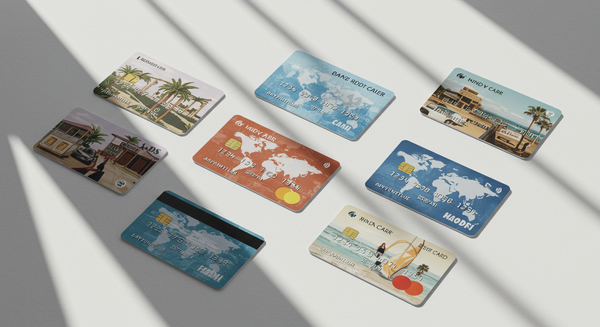The Future of Award Travel: Navigating a Changing Landscape
Award travel's future involves dynamic pricing, tech-driven personalization, and sustainability. As loyalty programs move toward revenue-based models and premium memberships, travelers must adapt strategies, stay flexible, and optimize points with credit cards and innovative rewards.

In our Q3-2024 analysis we discuss several key trends that are likely to shape the direction of Award Travel in years to come. Some have a strong focus on loyalty programs, while others are built to underscore reward redemption strategies, and the overall experience of travelers for a larger corporate margin. Understanding these trends can empower travelers to maximize their rewards and navigate the complexities of the evolving award travel ecosystem.
1. The Evolution of Loyalty Programs
Loyalty programs have come a long way since their inception, and they continue to evolve to meet the changing needs of both travelers and businesses. Traditionally, airline loyalty programs operated on a fixed award chart, where specific point values were assigned to particular routes or fare classes. This made it relatively easy for travelers to predict how many miles they needed for a flight and plan their redemptions accordingly.
However, in recent years, many airlines have shifted toward dynamic award pricing. This means that the number of miles required for a flight is now tied to the cash price of the ticket, with redemption values fluctuating based on demand, time of booking, and other factors. While this offers greater flexibility for airlines, it has introduced uncertainty for travelers, who now face a less predictable landscape when it comes to redeeming their points and miles.
Looking ahead, we can expect further changes in loyalty programs as airlines and hotels continue to experiment with new models. One emerging trend is the shift from mileage-based programs to revenue-based programs, where travelers earn points based on how much they spend rather than how far they fly. This trend aligns with airlines' desire to reward their most profitable customers, but it may also reduce the value of points for travelers who primarily fly on discounted fares.
In response to these changes, savvy travelers will need to adapt their strategies. Instead of hoarding miles, it may become more important to earn and redeem them strategically, taking advantage of opportunities as they arise rather than waiting for a "perfect" redemption. Additionally, travelers may need to diversify their loyalty program memberships, spreading their points across multiple airlines and hotels to ensure they have options when it comes time to redeem.
2. The Impact of Technology on Award Travel
Technology is playing a significant role in shaping the future of award travel. From mobile apps to artificial intelligence, tech innovations are making it easier for travelers to earn, track, and redeem points, while also offering new ways for loyalty programs to engage with their customers.
One of the most significant technological advancements in recent years has been the rise of travel booking apps and platforms that integrate loyalty program information. These tools allow travelers to search for flights and accommodations while automatically factoring in their loyalty program status and available points. This streamlines the booking process and ensures that travelers can make the most of their rewards.
Additionally, artificial intelligence and machine learning are being used by loyalty programs to offer personalized recommendations and targeted promotions. For example, AI can analyze a traveler's past behavior and preferences to suggest specific redemptions or offers that align with their interests. This level of personalization enhances the overall customer experience and can help travelers discover valuable opportunities they might have otherwise missed.
Blockchain technology is also poised to have an impact on award travel in the coming years. Some companies are exploring the use of blockchain to create decentralized loyalty programs, where points and miles can be easily transferred between different brands and platforms. This could lead to greater flexibility for travelers, as they would no longer be locked into a single loyalty program and could potentially exchange points across different industries.
While technology offers many benefits, it also presents challenges. As loyalty programs become more data-driven and personalized, travelers may need to be more vigilant about protecting their privacy and ensuring that their data is used responsibly. Additionally, the increased reliance on dynamic pricing and AI-driven recommendations could make it harder for travelers to predict the best times to book or redeem their rewards, requiring a greater degree of adaptability and real-time decision-making.
3. The Rise of Subscription Models and Premium Loyalty Programs
In recent years, we've seen a growing trend toward subscription-based loyalty programs and premium membership tiers. These models allow travelers to pay a monthly or annual fee in exchange for enhanced benefits, such as access to exclusive lounges, expedited security screening, and additional points-earning opportunities. For airlines and hotels, subscription models offer a steady revenue stream and help lock in customer loyalty, while for travelers, they provide a way to access perks and rewards without needing to achieve elite status through frequent travel.
This trend is likely to continue as more companies experiment with subscription-based loyalty programs. For example, some airlines have introduced subscription plans that offer benefits like complimentary checked bags, priority boarding, and even flight credits. Similarly, hotels are offering premium membership tiers that grant access to room upgrades, late check-out, and other exclusive amenities.
For frequent travelers, these subscription models can offer significant value, especially if they regularly use the services provided by the program. However, it's important for travelers to carefully evaluate the cost-benefit ratio of these programs. While premium memberships can provide access to valuable perks, they may not always be worth the investment for travelers who don't fly or stay in hotels frequently enough to take full advantage of the benefits.
In the future, we can expect to see even more innovative subscription models emerge, catering to specific traveler segments. For example, airlines and hotels may introduce tiered subscription plans that allow travelers to choose the level of benefits that best suits their needs, whether it's a basic plan for occasional travelers or a premium plan for road warriors who are constantly on the move.
4. The Increasing Focus on Sustainability and Social Responsibility
As environmental and social concerns become more prominent in the travel industry, loyalty programs are starting to reflect these values. In the future, we can expect award travel to increasingly focus on sustainability and social responsibility, with airlines and hotels offering more opportunities for travelers to make environmentally conscious choices with their points and miles.
Some airlines have already begun allowing travelers to use their miles to offset carbon emissions from their flights. This trend is likely to expand as more companies seek to align their loyalty programs with broader sustainability goals. Additionally, hotels are increasingly offering rewards for eco-friendly behavior, such as opting out of housekeeping services or choosing energy-efficient room upgrades.
In response to growing consumer demand for ethical travel options, loyalty programs may also introduce partnerships with charitable organizations, allowing travelers to donate their points and miles to support social causes. This could create a new dimension of value for travelers who are looking to make a positive impact while still enjoying the benefits of award travel.
As sustainability becomes a more significant factor in award travel, travelers will need to weigh the environmental and social implications of their choices. This may mean making trade-offs between convenience and sustainability, such as choosing a more eco-friendly hotel brand or opting for a lower-carbon mode of transportation, even if it means fewer points or miles earned.
5. The Post-Pandemic Travel Boom and Its Impact on Award Travel
The COVID-19 pandemic had a profound impact on the travel industry, leading to a temporary halt in travel and a significant reduction in demand for flights and hotel stays. However, as the world has emerged from the pandemic, travel has rebounded in a big way, with pent-up demand driving a surge in bookings and a return to pre-pandemic travel levels.
This post-pandemic travel boom has had both positive and negative effects on award travel. On the one hand, the increased demand for travel has made it more challenging for travelers to find award availability, especially for popular destinations and premium cabins. Dynamic pricing models have exacerbated this issue, with airlines and hotels charging more points for flights and stays during peak travel periods.
On the other hand, the resurgence of travel has also led to new opportunities for earning points and miles. Credit card companies, airlines, and hotels have rolled out a range of promotions and bonuses to attract travelers, offering accelerated earning rates, sign-up bonuses, and targeted offers. Additionally, as business travel gradually returns, many travelers are finding themselves earning more points and miles through work-related travel, which they can then use for leisure trips.
The post-pandemic travel boom is likely to continue influencing award travel for years to come. As demand stabilizes, we may see a return to more predictable award availability, but travelers should still be prepared for fluctuations in pricing and availability, especially during peak travel seasons. Flexibility and advanced planning will be key to securing the best redemptions in this new travel landscape.
6. The Role of Credit Cards in the Future of Award Travel
Credit cards have long played a central role in award travel, with many travelers earning the majority of their points and miles through everyday spending rather than actual travel. In recent years, credit card issuers have ramped up their offerings, introducing new cards with lucrative sign-up bonuses, enhanced rewards structures, and premium perks.
redit cards will continue to be a critical tool for travelers looking to maximize their points and miles. However, the landscape of credit card rewards is also evolving. Card issuers are increasingly focused on offering flexible rewards that can be redeemed across multiple travel brands, rather than tying cardholders to a single airline or hotel loyalty program. This shift toward flexibility is a response to changing consumer preferences, with many travelers seeking more freedom in how they use their rewards.
In the future, we may see even more innovative credit card offerings that cater to specific travel needs. For example, cards could offer tailored rewards based on a traveler's preferred destinations, travel style, or sustainability goals. Additionally, credit card issuers are likely to continue enhancing their digital tools, making it easier for cardholders to track their rewards, manage their accounts, and redeem their points on the go.
For travelers, the key to maximizing credit card rewards will be staying informed about the latest offers and promotions




